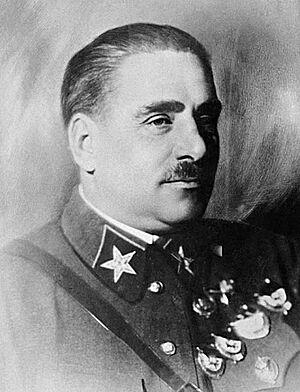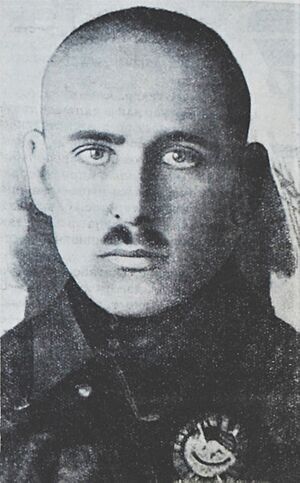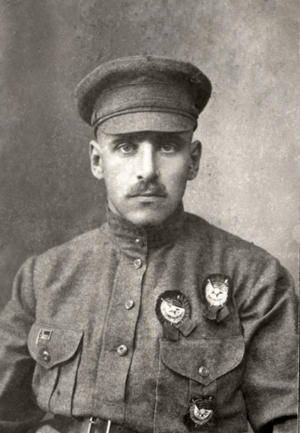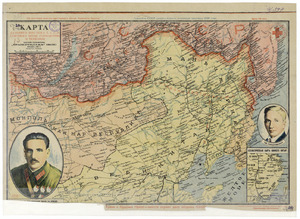Vasily Blyukher facts for kids
Quick facts for kids
Vasily Blyukher
|
|
|---|---|

Blyukher c. 1930s
|
|
| Birth name | Vasily Konstantinovich Gurov |
| Nickname(s) | "Red Napoleon" |
| Born | 1 December 1889 Barschinka, Russian Empire |
| Died | 9 November 1938 (aged 48) Moscow, Russian SFSR, Soviet Union |
| Buried |
Donskoi Cemetery
|
| Allegiance | |
| Service/ |
|
| Years of service | 1914–1915 1917–1938 |
| Rank | |
| Commands held | Special Red Banner Far Eastern Army |
| Battles/wars |
|
| Awards | Order of Lenin (2) Order of the Red Banner (4) Order of the Red Star |
| Signature |  |
Vasily Konstantinovich Blyukher (Russian: Васи́лий Константи́нович Блю́хер, tr. Vasiliy Konstantinovich Blyukher; 1 December 1889 – 9 November 1938) was a famous Soviet military leader. He became a Marshal of the Soviet Union, which was the highest military rank.
In 1938, Blyukher was arrested during a time when many military leaders were removed from their positions by Joseph Stalin. He died while in prison.
Contents
Early Life and Beginnings
Vasily Blyukher was born into a farming family in a village called Barschinka. His family's original name was Gurov. In the 1800s, a landlord gave his family the nickname Blyukher. This was to honor a famous Prussian military leader named Gebhard Leberecht von Blücher.
As a teenager, Vasily worked in a factory. In 1910, he was arrested for leading a workers' strike and spent time in prison. In 1914, Vasily Gurov, who later officially used Blyukher as his last name, joined the army of the Russian Empire. However, he was badly wounded in 1915 and had to leave military service. He then worked in a factory in Kazan. In 1916, he joined the Bolshevik Party. He also took part in the Russian Revolution of 1917 in Samara.
Role in the Civil War
In late 1917, Blyukher joined the Red Guard forces. They moved to Chelyabinsk to stop a revolt. Blyukher joined the Red Army in 1918 and quickly became a commander. During the Russian Civil War (1917–1923), he was a very important leader for the Bolsheviks.
In 1918, a group called the Czech Legion revolted. Blyukher led a group of 10,000 soldiers called the South Urals Partisan Army. They marched 1,500 kilometers in 40 days, fighting continuously. They attacked the White forces from behind. Then, they joined up with other Red Army units.
For this amazing achievement, Blyukher received the first ever Order of the Red Banner in September 1918. This was a very high military award. He received it four more times later on. The award said his march was as great as famous military crossings in history.
After the Civil War, he was a military commander for the Far Eastern Republic from 1921 to 1922. He personally led a campaign to remove the last anti-Bolshevik forces in the Far East. From 1922 to 1924, he was the commander of the Petrograd military district.
Command in the Far East
From 1924 to 1927, Blyukher worked as a Soviet military adviser in China. He used the name Galen, which was his wife's name. He helped Chiang Kai-shek with military plans. Blyukher was important in planning the Northern Expedition (1926–1927). This expedition helped the Kuomintang unite China. One of the people he taught was Lin Biao, who later became a key figure in the Chinese army.
When he returned to the Soviet Union, he was given command of the Ukrainian Military District. In 1929, he was moved to a very important military command in the Far Eastern Military District. This was known as the Special Red Banner Far Eastern Army.
Blyukher was based in Khabarovsk. He had more freedom to make decisions in the Far East than other Soviet commanders. This region was very active because Japan was expanding into China and was unfriendly towards the Soviet Union. In the Russo-Chinese Chinese Eastern Railroad War of 1929–30, he quickly defeated Chinese forces.
For this success, he received the first Order of the Red Star in September 1930. People started calling him the "Red Napoleon". In 1935, he was made a Marshal of the Soviet Union. From July to August 1938, he led the Soviet Far East Front in a battle against the Japanese. This was at the Battle of Lake Khasan, near the border with Japanese-occupied Korea.
Later Life and Death
The importance of the Far East Front gave Blyukher some protection from Stalin's removal of Red Army commanders. This period of arrests and executions had started in 1937. Blyukher had even been part of the group that decided the fate of another high-ranking general, Mikhail Tukhachevsky.
On October 22, 1938, Blyukher was arrested. It was long believed that he was secretly tried and executed for spying. However, it was later revealed that he died in prison on November 9, 1938, after being severely injured during questioning. His body was cremated the same day.
In 1956, Blyukher was officially cleared of all charges. This process is called rehabilitation. He is still a well-known figure in Russia today.
Awards and Honors
- Two Orders of Lenin (1931, 1938)
- Order of Red Banner of RSFSR, three times
- Awarded on September 30, 1918
- Awarded on June 14, 1921
- Awarded on June 20, 1921
- Order of Red Banner of the USSR, twice
- Awarded on October 25, 1928
- Awarded in 1928 to celebrate 10 years of the Red Army
- Order of the Red Star (1930)
- Jubilee Medal XX Years of the Workers' and Peasants' Red Army (1938)
- Badge "5 years of the Cheka-GPU" (1932)
- Cross of St. George, 3rd and 4th classes
- Medal of St. George
Images for kids
See Also
 In Spanish: Vasili Blücher para niños
In Spanish: Vasili Blücher para niños
 | Emma Amos |
 | Edward Mitchell Bannister |
 | Larry D. Alexander |
 | Ernie Barnes |





